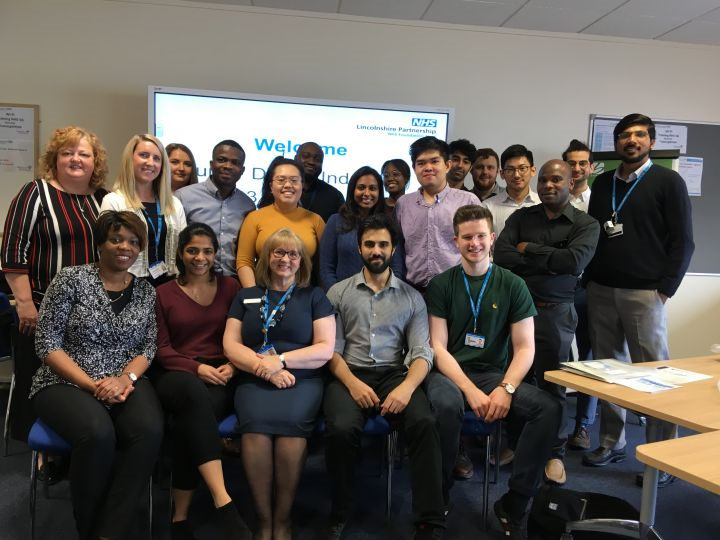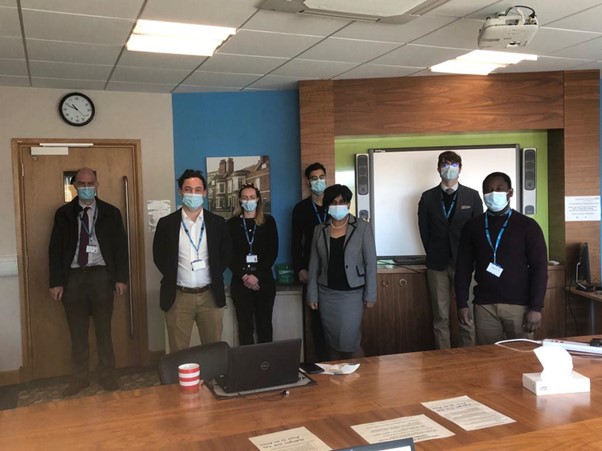General Adult Psychiatry
Why should I consider Specialty Training in General Adult Psychiatry?
General Adult Psychiatry is a fascinating, challenging and highly rewarding specialty involving working with some of the most diverse, vulnerable and stigmatised people in society.
General adult psychiatry encompasses a range of specialties involved with the provision of psychiatric care to working age adults.
Being alongside adults experiencing mental ill health is an immense privilege. Adults not only carry complex responsibilities including work and family but also have significant capacity to change. It's about realising potential and recovery.
You will encounter a wide range of disorders, including manifestations of “organic” brain disorders, psychoses, neurosis, mood disorders and personality disorders. You’ll work closely with other agencies within mental health. The psychiatrist works as an integral part of the team.
Work in general adult psychiatry allows you to maintain a varied practice, but there are also many opportunities to subspecialise. As such, you could work in a variety of settings and with a huge range of colleagues.
Knowledge of psychiatric disorders is developing, as are treatments. General Psychiatry is, therefore, a rapidly changing area of psychiatry and one that will allow significant personal development for those within it.
Here in the East Midlands we will help you to achieve your full potential!
Who are the lead contacts for General Adult Psychiatry?
We are a very welcoming specialty – if you feel General Adult psychiatry might be for you, get in touch – we are happy to talk and arrange clinical experience.
Training Programme Director (TPD) contact details for both South and North scheme: Dr Mahendra Kumar - mahendra.kumar@nhs.net
Directors of medical education will be able to give you specific information on Local education providers and some providers have created individual websites to highlight the wide-ranging opportunities available.
Nottingham & Mansfield DME kehinde.junaid@nottshc.nhs.uk
Derbyshire & Chesterfield DME vishnu.gopal@nhs.net
Lincolnshire DME beena.rajkumar@nhs.net
https://www.lpft.nhs.uk/work-for-us/medical/programmes/higher-trainers
South Programme
There are 21 ST places in the south rotation- 17 in Leicester and 4 in Northampton.
Dual training is available also and GA training can be combined with old age psychiatry or medical psychotherapy.
Endorsable Specialist posts are also in the scheme- Liaison Psychiatry in Leicester, Addictions in combination with Turning point Rehabilitation Psychiatry in Leicester and Northampton. We also have Perinatal Psychiatry in Northampton, Eating Disorders in Leicester, Early Intervention is Northampton and Leicester, and also posts in PICU, Assertive Outreach Team, Crisis Team and Forensic Psychiatry in addition to core GA posts combining Inpatients and Community.
North Programme
There are 26 GA NTNS in North HEEM of which 13 are in Nottingham, 4 in Chesterfield, 4 in Mansfield, 3 in Derby and 2 in Lincoln. These NTNS includes dual and academic training posts. Currently we have 2 dual posts (1 NTN from GA and one from Older Adult) and considering the recent demand, there is a planned increase to total 4 posts from Feb 2022 (2 NTNS each from Older adult and GA). In addition to this there are 2 dual Psychotherapy and two academic posts.
Training scheme:
We offer a three-year higher training programme in General Adult Psychiatry for doctors who have already demonstrated the essential competencies and completed core training from CT1 to CT3. Alternatively, to enter at the ST4 level, candidates should possess MRCPsych or equivalent qualification in addition to at least 3 years of experience after Foundation Year 1 training, out of which at least 30 months should be in the specialty of Psychiatry.
The postgraduate training programme is based on the Competency Based Curriculum for Specialist Training in General Adult Psychiatry developed by the Royal College of Psychiatrists (https://www.rcpsych.ac.uk/docs/default-source/training/curricula-and-guidance/general_psychiatry_curriculum_march_2019.pdf?sfvrsn=9e53c99a_6 ). It is designed to support training for obtaining a CCT in General Adult Psychiatry by working towards an Annual Review of Competency Progression each year. Entry to the programme is through the National Recruitment System administered by Health Education England North West (https://www.nwpgmd.nhs.uk/st4_psy_train_rec_oview ).
There are able to offer endorsements in:
Substance misuse (https://www.rcpsych.ac.uk/docs/default-source/training/curricula-and-guidance/substance_misuse_psychiatry_curriculum_march_2019.pdf?sfvrsn=33dc7eb9_6 )
“Specialists in Substance Misuse Psychiatry work with others to assess, manage and treat people of all ages with mental health problems arising from, or complicated by, the misuse of substances such as alcohol, nicotine and other drugs. They also treat people who have gambling addiction. In addition to working with patients and their families, Substance Misuse Psychiatrists also contribute to the development and delivery of effective substance misuse services”.
Liaison Psychiatry (https://www.rcpsych.ac.uk/docs/default-source/training/curricula-and-guidance/liaison_psychiatry_curriculum_march_2019.pdf?sfvrsn=63de54cd_6 )
“Specialists in Liaison Psychiatry work with others to assess, manage and treat people with mental health problems in conjunction with physical (medical or surgical) illness. They have particular expertise in the relationship between physical illness and psychological distress and contribute to the development and delivery of effective services.”
Rehabilitation Psychiatry (https://www.rcpsych.ac.uk/docs/default-source/training/curricula-and-guidance/rehabilitation_psychiatry_curriculum_march_2019.pdf?sfvrsn=4a257216_6 )
“Specialists in Rehabilitation Psychiatry work with others to assess, manage and treat people with severe and enduring mental health problems, and contribute to the development and delivery of effective services for these people and their relatives and carers. The culture of services reflects the prime importance of personal and social outcomes over conventional cure of symptoms.”
Experienced Consultant Trainers will provide supervision on a weekly basis throughout the training. Study leave will form part of the educational programme and leave is managed through Intrepid leave management system. Funding is available for courses approved by Clinical Supervisors or Educational Supervisors. Additional funding requests would be automatically forwarded to TPD or HOS for approval.
Trainees will take part in an nonresident on-call Rota during evenings and weekends and the nature of these are variable dependent upon your location. Generally, these rotas will involve taking queries from junior trainees and other issues requiring senior input out of hours. There are also opportunities to complete out of hours mental health act assessments and as such you will be exposed to a variety of settings.
- The East midlands South HST on call Rota covers Leicestershire and at any time there are 2 STs on call.
- The East Midlands North HST is split into 4 localities Nottinghamshire, Derby, Chesterfield and Lincoln; all have separate on call Rota’s.
- The NOTTINGHAM HST on call rota covers Nottingham and Mansfield and there are 3 STs on call each with their individual patch (City North/City South & Mansfield).
- Chesterfield has a HST rota combined with other specialties (older adult)
- Derby has a GA HST on call Rota.
- In Lincolnshire You will be supervised by the consultant on-call as the ‘first on-call’ for queries from junior trainees and other issues requiring senior input out of hours. There are also opportunities to complete out of hours mental health act assessments.
What are the available clinical opportunities in the East Midlands?
Training in General Adult Psychiatry in the East Midlands provides a range of inpatient, outpatient, community, and emergency work in urban and rural settings.
This is a multidisciplinary profession and we receive a range of referrals; and you will be involved in making decisions regarding the direction and outcomes for these referrals. During working hours you’ll be involved in seeing new and follow up patients in a variety of settings. Trainees will take part in an on-call Rota during evenings and weekends; the nature of these were vary depending upon your location but invariably will involve participating in Section 12(2) work. There will be ample opportunities to gain experience in preparing evidence for tribunals, attending tribunals and potentially other court reports.
Trainees have the opportunity to access a wide range of placements relevant to their training, including but not limited to; Early intervention in psychosis, Assertive outreach, Crisis and home treatment, Eating disorders, Perinatal psychiatry, Community forensic services, Adult ADHD & Specialist autistic spectrum disorder assessment (Now known as the Neurodevelopmental disorders services), Specialist depression and bipolar services, Gender dysphoria services, and Psychological services.
Throughout the three years, trainees are encouraged to complete psychotherapy cases in a range of modalities and will have dedicated supervision either individually or as a group to discuss from a psychological perspective. If psychotherapy interests, you then may also choose to involve yourself in the running of local Balint groups for junior trainees and medical students.
As a higher trainee you will be encouraged to develop competencies in a wide variety of areas including but not limited to, Management & leadership, Medical Education, Clinical Governance, Clinical Audit, Quality and improvement and Research. Many of the trusts will run schemes which can even enable you to achieve postgraduate qualifications in the aforementioned. Uniquely we have a close working relationship with local universities and medical schools and many opportunities are available to you both in medical education and clinical research.
There will also be two dedicated sessions a week for special interest tailored to your training needs e.g. ECT, TMS, Management experience, Nottingham specialist depression service, research etc.
Where can I work?
The local trusts are well-established centres, with close links to national resources including the Royal College of Psychiatrists. The scheme operates as two carousels; East Midlands South which includes Leicestershire Partnership NHS Trust and Northamptonshire Health Care Foundation Trust and East Midlands North which includes Nottinghamshire Health Care Trust, Derbyshire Healthcare NHS foundation trust and Lincolnshire Partnership NHS Foundation Trust, however there is ample opportunity for trainees to work across both centres to gain specific skills and clinical experience.
What would my training look like?
The trainee will rotate between three posts during their training to spend 12 months developing skills in each placement. A typical General adult higher trainees’ progression may be as below
- ST4 CORE (12 months) 50% community experience & 50% Inpatient experience or 12 months in inpatient.
- ST5 12 months in Subspeciality / Endorsement year e.g. Substance misuse
- ST6 12 months in Subspeciality - competencies focus, working towards a 3-month acting up period
Teaching and academic:
Trainees receive great benefits from the monthly Specialty Teaching Programme, owned and run by the trainees, with Consultant support. These sessions provide an opportunity for trainees to learn together, continuing professional development, facilitate peer group discussion and support. The schedule usually incorporates a Representative meeting where trainees are offered a safe space to confidentially comment on any training issues which can be shared and subsequently resolved with support from the wider specialty training committee. Trainees also attend the weekly Academic Programme/Journal/Case club within the appropriate Department. Trainees also have the opportunity to teach on the MRCPsych Teaching Programme. Trainees will often supervise medical students during their clinical placements and facilitate aspects of their programme such as clinical task groups. There is protected supervision incorporated in the timetable for one hour each week. Trainees are involved in wider medical student education and can also become mentors as part of the PsychStart programme.
Research and Quality Improvement:
Health Education East Midlands is an immensely supportive environment to train in General adult Psychiatry as part of Academic Clinical Fellow Posts. There is a strong research focus, and trainees supported by the Trust and the National Institute of Health Research. Not only enjoyable but this experience has helped the trainee to develop further as both a clinician and researcher. There are also links with the Institute of Mental Health in University of Nottingham. There are chances to undertake postgraduate qualifications, for example Diploma, PG certificate, Masters or MD. These opportunities are not limited to Academic fellows and are open to all higher trainees. Trainees are encouraged to use one of their special interest sessions each week for research, with opportunity for recruitment to multi-centre studies. There is a culture within the deanery where trainees are positively encouraged to take opportunities to develop in other areas in addition to clinical practice, such as quality improvement projects both through collaboration and in developing their own projects. Trainees can undertake additional training in Quality improvement to help fine tune their skills and support their individual projects.
Leadership and management experience:
The East Midlands have a long history of strongly promoting leadership and management at a local and national level and trainees in the scheme are actively encouraged and supported to develop their skills in this area. Trainees will gain excellent experience in leadership and management, including having the opportunity to work with or alongside clinicians/senior managers who undertake these leadership roles, as well as having support and time to lead on Quality Improvement initiatives, audit and other practical management projects. There are also many opportunities to take active leadership and management roles in the organisation local events that promote the specialty. Furthermore, some local education providers provide a route to gaining postgraduate qualifications in leadership and management. Leadership and management topics are included in the local monthly academic programme for trainees and trainees are supported to attend the Health Education East Midlands leadership training days.
What else should I know?
- Trainees are provided with furnished office space including a computer with internet access as well as IT facilities for remote working where needed
- There is flexibility within training (LTFT, External posts, Academic posts)
- Car parking is available on site, free of charge
- Each Team is supported by one or more medical secretaries who are based on-site
- Trainees are expected to drive his/her own vehicle. Home visits should be arranged in close liaison with the members of the multidisciplinary team. Higher specialist trainees are expected to travel during their on-call should the need arise.
- Trainee Support: In addition to support from Clinical , Education Supervisors and TPD, if trainees are having difficulties in progressing , there is HEEM supported The Professional Support and Wellbeing Services (PSW) who provides short term ,solution focused intervention.

Useful links:
Royal College of Psychiatry https://www.rcpsych.ac.uk/training
Faculty of General Adult Psychiatry https://www.rcpsych.ac.uk/members/your-faculties/general-adult-psychiatry?searchTerms=general%20adult
Institute of Mental Health https://www.institutemh.org.uk/
Health Education East Midlands https://eastmidlandsdeanery.nhs.uk

